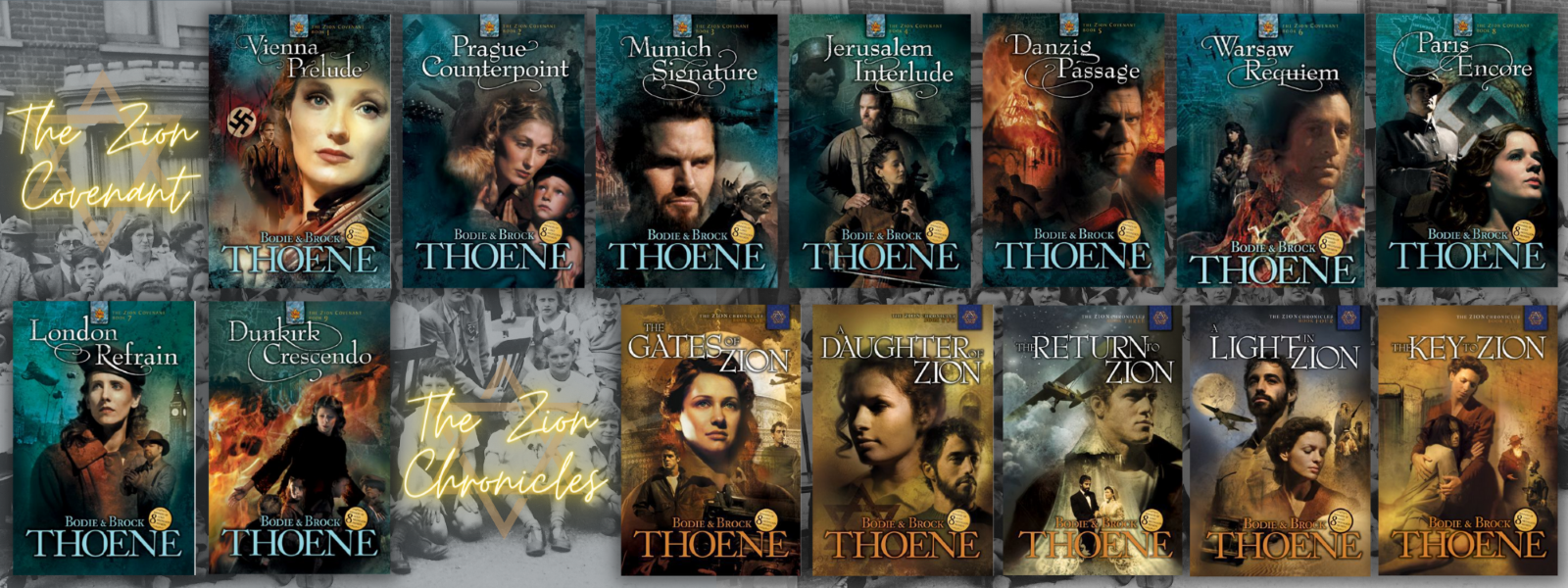These days I mostly read contemporary fiction, but every so often I delve into the past and read a book heralding a world before my time.
I finished reading Amanda Dykes poignant WWI story Yours is the Night late yesterday evening, and thought back on other historical novels and series I’ve read which have enthralled my heart and imagination while swiftly gut-punching me.
If you’re in the market for historical fiction filled with endearing characters, love stories, bittersweet moments, tragedy, and victory, check out the following books.

The Zion Covenant and The Zion Chronicles by Bodie & Brock Thoene
These two series are the first WWII fiction I ever read, etching my soul with a permanent mark. I read both when I was sixteen (apart from books 7-9 in Covenant, which were added nine years later).
The Dynamic Thoene Duo meticulously researched and penned an epic tale spanning the 1930s and 40s, with Covenant focused on the pre-war/war era while Chronicles follows Holocaust survivors after the war. It didn’t surprise me to discover these books are recognised as classic historical novels and are used to teach history in college classrooms around the world.
Without sounding melodramatic, these books changed me. Their riveting storylines not only brought to life my WWII history studies at school, but personalised a horrific era of time, entwining the plight of the Jewish people deep in my heart. This series also awakened an appreciation for romance stories, the importance of having batteries in your torch (when reading under the covers late at night), and taught me that swarming, rampant wickedness cannot snuff out the courage of those willing to fight for what is right.
Yours is the Night by Amanda Dykes
I have one word: phenomenal. Less than 24 hours have passed since I closed this book and I’m still processing its magnitude. Set primarily in France during WWI, this novel is an intricate tapestry of vivid war imagery—life in the trenches and the horrific choices men made every single day to survive—weaved with the reality of life for French civilians, yet written in such a delicate, lyrical “less is more” way that cruel and potentially gruesome details were more like subtle hints and gentle whispers, softening the many blows common in war fiction.
The characters burrowed into my heart, each diverse in perception and life experience, and touched by the circumstances of war in vast ways. I turned pages with trepidation, hopeful yet knowing any moment I could lose one to the tragedy of war. The bond of brothers-in-arms and “found family” was heartwarming, even in the face of darkness. And interlaced through the entire story was the reminder that God was in the night, shining His inextinguishable light and illuminating the shadows we might endure.

The London House by Katherine Reay
This split-time redemptive novel follows Caroline Payne’s present-day quest to uncover the truth about her family’s history—in particular, the existence of a great-aunt she thought had died as a child, and the secrets no one would utter—and delves into Britain’s WWII spy network, mainly through letters and correspondence, with her old college friend turned historian.
This story is a “journey of discovery” which explores the impact of war and the complexities of family relationships. I enjoyed the women’s fiction “feel”, with its hint of romance and heaping of history. I also liked how Caroline grew as a person while she followed her aunt’s trail.
A View Across the Rooftops by Suzanne Kelman
A widowed mathematics professor hides a Jewish student in his attic while his niece works for the regime he abhors. A young Jewish man banned from university now on the run, seeking refuge. Women with courage and fearlessness, helping The Resistance in a fearful time. And the naïve niece who trusts in the Third Reich and the love of a treacherous German soldier.
In another WWII novel, this story follows the brave Dutch citizens in German-occupied Amsterdam who help their Jewish neighbours. Threaded with grief, loss, love, hope, and the insidiousness of Nazi-Germany, this tale shares the history of a people who defied tyranny using their basements, walls and attics.
Note to readers: This story portrays the depravity of WWII, so reader discretion is advised. There are also two brief intimate scenes which are easy to skip if you choose.
Do you enjoy historical fiction? Let me know which era(s) you like to read in the comments below.
Until next time,

Affiliate Disclosure: As an Amazon Associate, I earn from qualifying purchases.
